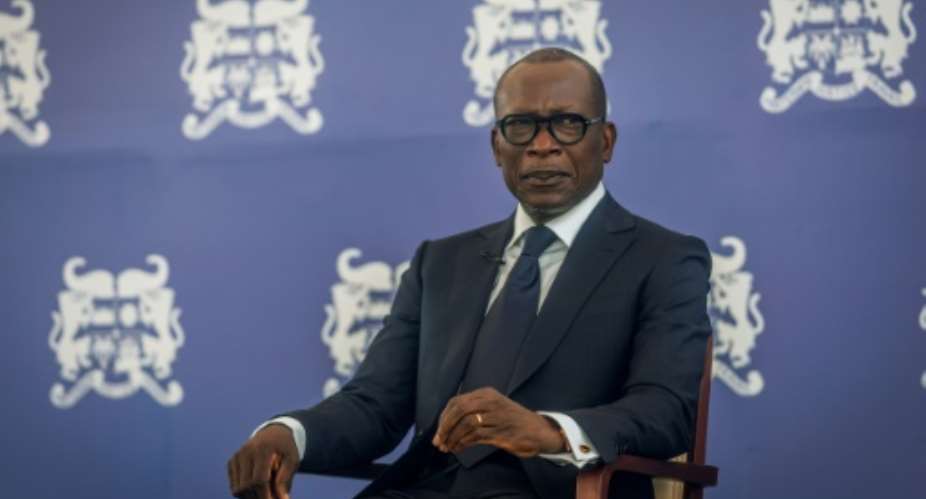Benin goes to the polls Sunday for a legislative ballot marked by the opposition's electoral return following a de-facto ban four years ago.
The 2019 vote was marked by deadly repression, historically low turnout and an internet shutdown in a country once renowned as a model for democracy in West Africa.
The majority of prominent opposition leaders are in exile or behind bars, but three opposition parties have been authorised to take part in the January 8 election.
In the runup to the vote, campaign posters were dotted around intersections in Cotonou, the country's economic capital.
A handful of activists rode around on motorbikes carrying placards of their parties.
"We call on the people of Benin to vote in peace, without violence, so we can have a parliament representative of the people," said Saliou Akadiri, national campaign director of the Democrats, the main opposition party.
"We will do everything so that our comrades in prison can be freed thanks to the amnesty law we are going to propose and so our comrades in exile can return."
'Thirst for change'
Elected in 2016, re-elected in 2021, wealthy businessman President Patrice Talon has launched a political and economic programme focussed on fast-tracking development.
But critics say this modernisation has been accompanied by an erosion of democracy.
 Opposition leader Reckya Madougou was handed a 20-year term for 'terrorism' by a special court in December 2021. By Yanick Folly (AFP)
Opposition leader Reckya Madougou was handed a 20-year term for 'terrorism' by a special court in December 2021. By Yanick Folly (AFP)
Two of Talon's main adversaries -- Joel Aivo and Reckya Madougou -- are still imprisoned after they were handed heavy sentences just over a year ago.
In the 2019 election, opposition parties faced changes to electoral rules that effectively barred them fielding candidates, stifling the mood in a country famed for its vibrant politics.
Supporters who took to the streets in the centre of the country, the stronghold of former President Thomas Boni Yayi, were violently repressed.
Only the two political formations backed by Talon -- the Progressive Union (UP) and the Republican Bloc (BR) -- were able to take part.
In 2021, key opposition leaders also did not participate in the presidential election.
Komi Koutche, a former minister now living in exile in the US after he was sentenced in absentia to 20 years in prison, said he was "confident" of a win for the Democrats.
"My wish is that we can meet again soon and not just virtually," he said, smiling during a video press conference.
Other opposition figures in exile will not participate, including Sebastien Ajavon, who came third in the 2016 presidential election and was sentenced in absentia to 25 years in prison.
"These are the same people who have been there since 1990, Beninese are thirsty for new faces, for change," Gaffarrou Radji, a spokesperson for the opposition Popular Liberation Movement (MPL), told AFP.
Rejectionists
Distel Amoussou, a campaign coordinator of the pro-government BR party insists on the "qualitative leap" made since Talon came to power and introduced his reform programme.
"We agree that no human work is perfect, these reforms can still be perfected," Amoussou told AFP.
"But we do not intend to leave room for rejectionists who have no convincing alternatives and who are going into these elections with a single idea, just to be anti-Talon."
The Cowry Forces for an Emerging Benin or FCBE, another opposition group formed by ex-president Yayi, will also seek some of the 109 seats up for election.
 Benin. By (AFP)
Benin. By (AFP)
Still, the opposition's participation in the legislative elections has "pacified" the process, making it "more interesting", said the Beninese political scientist Expédit Ologou.
"Obviously, there is more enthusiasm and that will certainly increase the participation rate," he said.
"But part of the population no longer believes in the sincerity of the ballot, as they believe that the dice are loaded in advance."
During the 2019 legislative election, abstention exceeded 70 percent, a historically high rate.
Another possible development is the place of women in these elections: the new electoral code requires that there be one woman elected per constituency, equal to at least 24 parliament seats.





 Tuesday’s downpour destroys ceiling of Circuit Court '8' in Accra
Tuesday’s downpour destroys ceiling of Circuit Court '8' in Accra
 SOEs shouldn't compromise on ethical standards, accountability – Akufo-Addo
SOEs shouldn't compromise on ethical standards, accountability – Akufo-Addo
 Father of 2-year-old boy attacked by dog appeals for financial support
Father of 2-year-old boy attacked by dog appeals for financial support
 Jubilee House National Security Operative allegedly swindles businessman over sa...
Jubilee House National Security Operative allegedly swindles businessman over sa...
 Nobody can order dumsor timetable except Energy Minister – Osafo-Maafo
Nobody can order dumsor timetable except Energy Minister – Osafo-Maafo
 Mahama wishes National Chief Imam as he clock 105 years today
Mahama wishes National Chief Imam as he clock 105 years today
 J.B.Danquah Adu’s murder trial: Case adjourned to April 29
J.B.Danquah Adu’s murder trial: Case adjourned to April 29
 High Court issues arrest warrant for former MASLOC Boss
High Court issues arrest warrant for former MASLOC Boss
 Align academic curriculum with industry needs — Stanbic Bank Ghana CEO advocates
Align academic curriculum with industry needs — Stanbic Bank Ghana CEO advocates
 Election 2024: We'll declare the results and let Ghanaians know we've won - Manh...
Election 2024: We'll declare the results and let Ghanaians know we've won - Manh...
